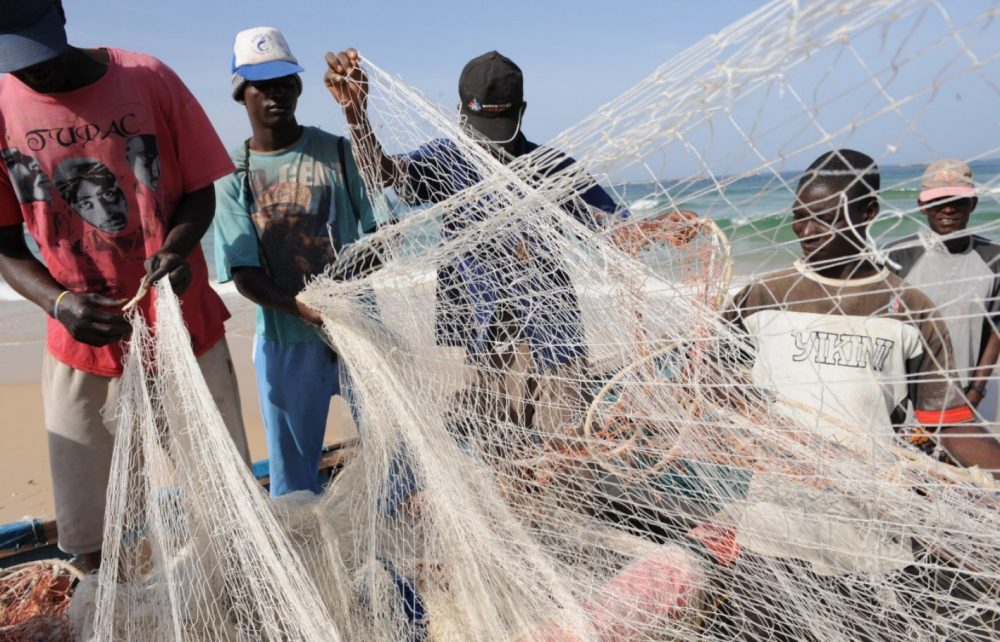The governments of coastal states across Africa have complained about the impact of unregulated and unlicensed fishing on local fish populations. Fish stocks in other parts of the world have crashed and now many industrial scale vessels have moved into African waters. While Beijing’s shoulders much of the blame, it is not the only culprit. The European Union has failed to prosecute illicit operations by ships from its member states, while African governments – including in Lusophone states – are seeking to cash in by selling licenses to foreign fleets.
According to the United Nations, 90% of global fisheries are either fished out or overfished. Fishing out one area before moving on to another does not seem to be a sustainable policy and will surely lead to a collapse in global fish populations if it is not stopped or at least regulated in a more muscular manner.
In May, Greg Poling, director of the U.S. Center for Strategic and International Studies’ Asia Maritime Transparency Initiative, said that fish stocks in the South China Sea were “on the verge of collapse”. Disputed sovereignty claims over the South China Sea have prevented effective regulation and management. This is devastating for the region but given that the Sea accounts for about 12% of all fish taken globally, falling catches there are driving fishing vessels from China and other Asian countries to Africa in search of healthier fish populations.
China consumes more than a third of all fish taken globally and so Chinese vessels are active around the globe. Many of the ships operating in African waters come from China and many of the fish that vessels from other countries catch are sold to Chinese customers. According to UK-headquartered Oceanmind, 75% of even the licensed fishing vessels operating off West Africa are Chinese.
A host of Chinese companies are investing in the African continent, including Zhongyu Global Seafood Corporation, which has announced that it will build a new fish processing plant in Guinea-Bissau. Zhang Zhiming, the chief executive of Chinese fishing company Yu Yi Industry Company, which operates in Mozambique, admitted at the end of 2018 that China was expanding its global fishing operations in order to compensate for falling domestic catches.
African resistance
In March, the foreign minister of the self-declared independent state of Somaliland, Yasin Hagi Mahamoud, appealed to the international community to help Africa stand up to Chinese fishing pressure. He wrote: “Somaliland’s small fishing fleet cannot compete with Chinese vessels and the advanced technology that they employ”. The Chinese vessels operating in Somaliland’s waters are presumably those that have been licensed in Somalia itself.
Amid complaints of falling catches in Madagascar, it has been widely reported that the Chinese and Malagasy governments have signed a ten year US$2.7 billion agreement that provides for the replacement of Madagascar’s traditional fishing boats with 330 modern refrigerated vessels. In return, a proportion of the fish caught will be sold to China but the prices involved have not been revealed. There have been protests against the agreement by local communities, environmental groups and development NGOs, as well as criticism over the opaque nature of the deal.
If even licensed international fishing threatens stocks, illegal activity makes the situation a good deal worse. Katie St John Glew, a marine biologist at the UK’s National Oceanography Centre at the University of Southampton, said: “Approximately 20% of all global catch is illegal, unreported or unregulated…If illegal fishing ultimately could result in stocks collapsing, this will then affect the livelihood of fishers across the globe.”
Illegal fishing by foreign vessels has profound implications for the livelihood of millions in Africa. It was also one of the main causes for the explosion of pirate activity off the coast of Somalia, as many pirates were originally fishermen who took direct action against factory fishing ships, particularly as the crew of some foreign vessels were known to cut the lines of small Somali fishing boats.
There have been protests in many African maritime countries, including in Gambia against a fishmeal factory owned by China’s Golden Lead. Sierra Leone banned all fishing by Chinese boats for a month earlier this year and some Kenyan fish traders have resorted to selling farmed fish imported from China because local stocks have crashed.
Confused Angolan policy
While some effort is being put into controlling the activities of large non-African fishing vessels, whether through licensing or surveillance to detect illegal operations, some African governments have sanctioned the creation of large domestic factory fleets. This will allow them to benefit financially from the sector but could have the same devastating impact on sea life. For instance, 50 new vessels, each with 120 tonne capacity, are being built in China for use in Angola.
Bigger, more modern fishing ports, capable of serving ever larger vessels, are now being developed in many African countries. A new port was completed in Angola’s Porto Amboim, in Kwanzu Sul Province, in 2016 at a cost of US$50 million with four berths for large vessels and onshore refrigeration facilities. Such facilities are being developed to serve private sector operators, who are moving in to replace bankrupt state-owned Empresa Nacional de Pesca Industrial (Peskwanza). The government is currently considering whether to privatise Peskwanza, although all of its vessels are understood to need repairs.
Yet Angolan fish populations are already under pressure. A total of 499 small scale fishing operators and 80 industrial and semi-industrial vessels were licensed to fish in Angolan waters between March 2018 and May 2019. The Ministry of Fisheries and the Sea has already had to cut fishing quotas for sardines and mackerel for this year by 30% to prevent a dramatic crash in populations, while periodic bans have also been imposed on fishing for some other species. At the same time, the Ministry is unable to finance inspections to determine the size of fish populations in the country.
For China not Mozambique
Some Chinese companies are acquiring new vessels specifically to fish in African waters. Shenzhen-based Yu Yi Industry Company increased the size of its fleet from six boats in 2018 to 18 this year to fish offshore Mozambique. Only one of the 130 large vessels licensed to fish offshore Mozambique is Mozambican and the Chinese role in the country’s illicit fishing operations has been well documented (https://clbrief.com/chinese-timber-and-fishing-in-africa/).
It is important that the terms of licensing are actually published by the governments involved. Despite the progress that Mozambique has made in promoting transparent government, Maputo has failed to release the details of licenses it has awarded.
Indeed, the whole Mozambican fishing industry seems to be being developed specifically to supply China. Stonechen Commercial – Produtos de Pesca de Moma of China is developing a big fishing port and processing centre in Nampula Province that is scheduled for completion in October. The facility will serve 85 factory fishing ships, with most of the fish caught exported. Mozambique even began exporting two species of fish, kapenta and tilapia, caught in the Cahora Bassa reservoir to China this year.
Not just China
However, it would be wrong to pin the blame solely at China’s door. The problem is the result of massive overfishing by factory fishing ships and a variety of other vessels that target fish populations, including vulnerable shark populations, wherever they can find them. In September 2018, São Toméan officials seized a fishing vessel, the Vema, using intelligence provided by maritime NGO Sea Shepherd and Gabonese inspectors.
This was the third arrest achieved by joint operations by Sea Shepherd and officials from the two countries involved. In a statement, the NGO said: “Shark species are particularly vulnerable to overfishing because they’re slow to grow, late to mature and breed small numbers of offspring.”
The Vema was licensed for tuna fishing but the boat’s hold was found to solely contain sharks, mainly blue sharks with their fins cut off for shark fin soup, together with fishing equipment designed to catch sharks. The International Union for Conservation of Nature classifies blue sharks as “near threatened”.
Spanish vessels have been seized on several occasions, including on operations where the Portuguese navy has supported São Tomé and Príncipe but the European Union has opted not to prosecute Spanish vessels, despite appeals by São Tomé Fisheries.
Sea Shepherd director of campaigns Peter Hammarstedt said: “It is alarming that industrial fishing vessels, many from Europe, continue to massacre sharks under the guise of tuna licenses. These Trojan horse fishing licenses deliberately mislead African coastal states as fishing vessels slaughter sharks with reckless abandon.” Yet while European fishing boats are also responsible, the demand for shark fin soup, which drives the illegal fishing that damages fragile ocean ecosystems, is located firmly in China and other parts of East Asia.
Although the government of São Tomé and Príncipe is working to crack down on illegal fishing operations, it is in talks with Beijing over the construction of a new fishing port to support “industrial fishing” in the country, according to João Pessoa, the director general of São Tomé Fisheries. It remains to be seen whether this facility will be included in plans for a multi-purpose port on São Tomé, which could be financed by a broader Chinese funding package for the country. Large European Union vessels already catch tuna in the country.




